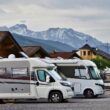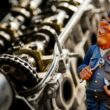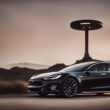Many are still concerned with the question of whether the electric car will prevail. According to Renault Germany boss Uwe Hochgeschurtz, it has already done so. In a few years there should even be no alternative.
In 2020, the e-car will have made the breakthrough, as can be seen in the example of Renault, because the battery-electric small car Zoe has risen to the manufacturer's best-selling model in this country with over 30.000 new registrations, as Renault's Germany boss Uwe Hochgeschurtz emphasized at a balance sheet press conference. For the manager, the electric car is already on the winning track: "E-mobility has left its niche and will become the leading type of drive this decade," said Hochgeschurtz. "The absolute paradigm shift to electromobility took place in Germany in 2020."
Even if the current e-car boom can be attributed to a significantly increased environmental bonus, according to Hochgeschurtz, battery-electric drive technology will establish itself in the medium term even without subsidies. "There is no turning back, the battery electric vehicle is the only alternative with which we can immediately reduce our CO2 emissions and improve the quality of the air." For 2030, the manager predicts that electric cars will have "an extremely high market share".
The car manufacturer Renault, which relied on vehicles with battery-electric drives relatively early on, wants to significantly expand its commitment in this area in the near future. The Renault Group's range of products in Germany is expected to grow to eight electric vehicles by 2022. The Twingo Electric models, an E version of the new Kangoo and the plug-in hybrids from Captur and Megane are already in the starting blocks. In the middle of the year, the Dacia Spring Electric will also appear in the lowest price segment, which should enable all classes to enter e-mobility with an unrivaled low price. With the Megane E-Vision, Renault also presented the new battery-electric CMF-EV platform at the end of 2020, which marks the start of a completely new generation of E-models for the alliance partners Nissan and Mitsubishi. However, it has not yet been revealed which models will be based on the new platform.
For the time being, Hochgeschurtz does not give hydrogen technology any opportunities in the passenger car segment due to the high costs and low efficiency compared to battery technology. Rather, hydrogen will remain a research topic of the future. It offers potential, especially in the heavy-duty sector, but it will probably be decades before it becomes established there.

On the picture: Renault boss Uwe Hochgeschurtz




